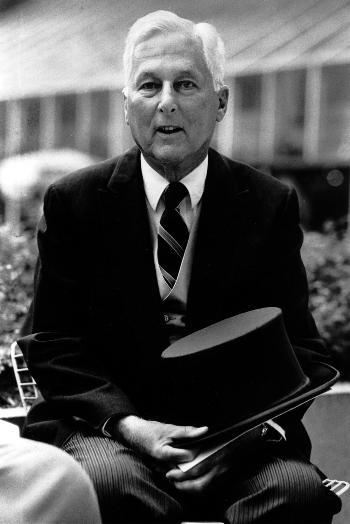
News
Summers Will Not Finish Semester of Teaching as Harvard Investigates Epstein Ties

News
Harvard College Students Report Favoring Divestment from Israel in HUA Survey

News
‘He Should Resign’: Harvard Undergrads Take Hard Line Against Summers Over Epstein Scandal

News
Harvard To Launch New Investigation Into Epstein’s Ties to Summers, Other University Affiliates

News
Harvard Students To Vote on Divestment From Israel in Inaugural HUA Election Survey
Nathan Pusey Dead at 94

Nathan M. Pusey ’28, Harvard’s 24th President, died of heart disease this morning at a New York City hospital at the age of 94.
Pusey’s administration spanned both the prosperous 1950s and the turbulent 1960s. He suceeded University president James B. Conant ’14 in 1953 and served until his retirement in 1971.
“A lot of things that we see and take for granted here at Harvard really had
their origin when he was at the helm,” said President Derek C. Bok, who succeeded Pusey as president.
During his Harvard tenure, Pusey spearheaded the University’s first major fundraising campaign, led major modern campus construction initiatives and focused on undergraduate education.
A strong opponent of McCarthyism, Pusey is credited with upholding Harvard’s dedication to academic freedom in the face of blacklists and allegations of treason.
But Pusey’s last years as president were characterized by the political turmoil and student activism of the 1960s. He is often remembered for his controversial decision to use police to evict occupying students from University Hall.
In an interview with The Crimson last year, Pusey said that despite what he called the “time of troubles,” he enjoyed his Harvard tenure.
“That was the best time to be a president almost in modern history,” he said. “I had a constructive and happy presidency there of quite a few years.”
Pusey first came to Harvard in 1924, and gained a Harvard Ph.D. in 1937. After a teaching career at a variety of small liberal arts colleges, Pusey became president of Lawrence College in 1944. Pusey returned to Harvard to assume the top post in 1953.
The first president born west of the Mississippi river, Pusey was a devout Episcopalian and contributed significantly to the strengthening of the Harvard Divinity School.
Upon arrival, one of his first priorities was putting the University’s recently expanded programs and research activities on a more solid financial base. An able and aggressive fundraiser, Pusey traveled the country, appearing on national television to make the case for Harvard’s need.
During his tenure, Harvard’s endowment increased from $304 million to more than $1 billion.
After passing the presidential reins to Bok in 1971, Pusey moved to New York City, working for a variety of non-profit organizations.
He served as president of the Andrew W. Mellon Foundation from 1971 to 1975. He later focused his efforts on religious and mental health initiatives.
Bok described Pusey as an “unfailingly kind and supportive” predecessor.
“Behind the official, he was an enormously kind and decent and unpretentious human being,” he said. “Whether one agreed with him or not, he was a man of great integrity.”
Pusey was in good health when he last returned to Harvard for Commencement exercises in June, where all four living presidents were present.
University spokesperson Rebecca Rollins said Pusey’s health began to decline in recent weeks.
Memorial services will be held sometime during the next few days at St. James Church in New York, she said.
Pusey is survived by his wife, Anne Woodward Pusey, two sons, Nathan M. Pusey Jr. and James R. Pusey, and a daughter, Rosemary Hopkins.
Want to keep up with breaking news? Subscribe to our email newsletter.
